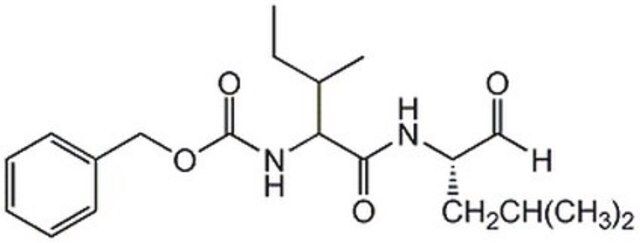565770
DAPT
≥98% (HPLC), lyophilized, γ-secretase inhibitor, Calbiochem®
Synonym(s):
γ-Secretase Inhibitor IX, DAPT, N-[N-(3,5-Difluorophenacetyl-L-alanyl)]-S-phenylglycine t-Butyl Ester
About This Item
Recommended Products
product name
γ-Secretase Inhibitor IX, Gamma-Secretase Inhibitor IX - CAS 208255-80-5, is a cell-permeable inhibitor of γ-secretase (Aβtotal IC₅₀ = 115 nM, Aβ42 IC₅₀ = 200 nM).
Quality Level
Assay
≥98% (HPLC)
form
lyophilized
manufacturer/tradename
Calbiochem®
storage condition
OK to freeze
protect from light
solubility
DMSO: 20 mg/mL
shipped in
ambient
storage temp.
−20°C
InChI
1S/C23H26F2N2O4/c1-14(26-19(28)12-15-10-17(24)13-18(25)11-15)21(29)27-20(16-8-6-5-7-9-16)22(30)31-23(2,3)4/h5-11,13-14,20H,12H2,1-4H3,(H,26,28)(H,27,29)/t14-,20-/m0/s1
InChI key
DWJXYEABWRJFSP-XOBRGWDASA-N
General description
Biochem/physiol Actions
Packaging
Warning
Other Notes
Nishitomo, K. et al. 2006 J. Neurochem.99, 1555.
Oddo, S., et al. 2004. Neuron43, 321.
Dovey, H.F., et al. 2001. J. Neurochem.76, 173.
Sastre, M., et al. 2001. EMBO Rep.2, 835.
Vandermeeren, M., et al. 2001. Neurosci. Lett.315, 145.
Legal Information
Storage Class Code
11 - Combustible Solids
WGK
WGK 3
Flash Point(F)
Not applicable
Flash Point(C)
Not applicable
Certificates of Analysis (COA)
Search for Certificates of Analysis (COA) by entering the products Lot/Batch Number. Lot and Batch Numbers can be found on a product’s label following the words ‘Lot’ or ‘Batch’.
Already Own This Product?
Find documentation for the products that you have recently purchased in the Document Library.
Customers Also Viewed
Our team of scientists has experience in all areas of research including Life Science, Material Science, Chemical Synthesis, Chromatography, Analytical and many others.
Contact Technical Service














